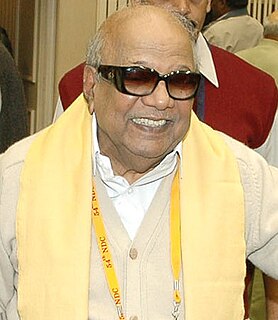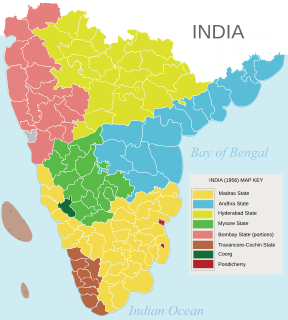
The All India Anna Dravida Munnetra Kazhagam is an Indian regional political party with great influence in the state of Tamil Nadu and union territory of Puducherry. It is currently the main opposition party in the Tamil Nadu Legislative Assembly and part of the India-ruling National Democratic Alliance. AIADMK is a Dravidian party founded by former chief minister of Tamil Nadu M. G. Ramachandran (M.G.R.) at Madurai on 17 October 1972 as a breakaway faction from the Dravida Munnetra Kazhagam after M. Karunanidhi expelled him from the party for asking for accounts as party treasurer. The party is adhering to the socio-democratic and social justice principles based on C. N. Annadurai collectively coined as Annaism by M.G.R.

The Dravida Munnetra Kazhagam is a social-democratic and Dravidianist political party in the state of Tamil Nadu and the union territory of Puducherry.

Marudhur Gopalan Ramachandran, also popularly known as M.G.R., was an Indian politician, actor, philanthropist and filmmaker who served as the chief minister of Tamil Nadu from 1977 till his death in 1987. He was the founder of AIADMK and mentor of J. Jayalalithaa. On 19 March 1988, M.G.R. was posthumously honoured with Bharat Ratna, India's highest civilian honour.

Muthuvel Karunanidhi was an Indian writer and politician who served as Chief Minister of Tamil Nadu for almost two decades over five terms between 1969 and 2011. He was popularly referred to as Kalaignar (Artist) and Mutthamizh Arignar for his contributions to Tamil literature. He had the longest tenure as Chief Minister Of Tamil Nadu with 6,863 days in office. He was also a long-standing leader of the Dravidian movement and ten-time president of the Dravida Munnetra Kazhagam political party. Karunanidhi has the record of never losing an election to the Tamil Nadu Assembly, having won 13 times since his first victory in 1957. Before entering politics, he worked in the Tamil film industry as a screenwriter. He also made contributions to Tamil literature, having written stories, plays, novels, and a multiple-volume memoir. Karunanidhi died on 7 August 2018 at Kauvery Hospital in Chennai after a series of prolonged, age-related illnesses.

Muthuvel Karunanidhi Stalin ( is an Indian politician serving as the 8th and current Chief Minister of Tamil Nadu. The son of the former Chief Minister M. Karunanidhi, Stalin has been the president of the Dravida Munnetra Kazhagam party since 28 August 2018. He was the 37th Mayor of Chennai from 1996 to 2002 and 1st Deputy Chief Minister of Tamil Nadu from 2009 to 2011. Stalin was placed 30th on the list of India's Most powerful Personalities in 2019 by The Indian Express.

Conjeevaram Natarajan Annadurai, popularly known as Anna also known as Arignar Anna or Perarignar Anna, was an Indian politician who served as the fourth and last Chief Minister of Madras State from 1967 until 1969 and first Chief Minister of Tamil Nadu for 20 days before his death. He was the first member of a Dravidian party to hold either post.
The anti-Hindi-imposition agitations of Tamil Nadu were a series of agitations that happened in the Indian state of Tamil Nadu during both pre- and post-independence periods. The agitations involved several mass protests, riots, student and political movements in Tamil Nadu concerning the official status of Hindi in the state.
Dravida Nadu is the name of a proposed sovereign state demanded by Justice Party led by E. V. Ramasamy and the Dravida Munnetra Kazhagam (DMK) led by C. N. Annadurai for the speakers of the Dravidian languages in South India.

Tamil Nadu Legislative Council was the upper house of the former bicameral legislature of the Indian state of Tamil Nadu. It began its existence as Madras Legislative Council, the first provincial legislature for Madras Presidency. It was initially created as an advisory body in 1861, by the British colonial government. It was established by the Indian Councils Act 1861, enacted in the British parliament in the aftermath of the Indian Rebellion of 1857. Its role and strength were later expanded by the second Council Act of 1892. Limited election was introduced in 1909. The Council became a unicameral legislative body in 1921 and eventually the upper chamber of a bicameral legislature in 1937. After India became independent in 1947, it continued to be the upper chamber of the legislature of Madras State, one of the successor states to the Madras Presidency. It was renamed as the Tamil Nadu Legislative Council when the state was renamed as Tamil Nadu in 1969. The Council was abolished by the M. G. Ramachandran administration on 1 November 1986. In 2010 the DMK regime headed by M. Karunanidhi tried to revive the Council. The former AIADMK regime (2016-2021) expressed its intention not to revive the council and passed a resolution in the Tamil Nadu Legislative Assembly in this regard.

The Lok Sabha constituency Chennai South is one of three constituencies in Chennai, Tamil Nadu. It was formerly known as Madras South. It was created in 1957 through bifurcation of Madras Lok Sabha constituency. It is one of the most populous parliamentary constituencies in South India.
Politics of Tamil Nadu is the politics related to the Indian state of Tamil Nadu.

The fifth legislative assembly election of Tamil Nadu was held in March 1971. Dravida Munnetra Kazhagam was re-elected, after its first victory under the leadership of C N Annadurai in 1967. This was the first time M. Karunanidhi, contested as the leader of DMK party won the election, since he assumed Chief Ministership for the first time, after the death of C N Annadurai. Karunanidhi had emerged successfully in the leadership crisis with other party leaders M. G. Ramachandran, and Nedunchezhiyan, which ensued after the death of C. N. Annadurai. The main opposition party in the election was Indian National Congress (Organisation) led by K. Kamaraj, whereas the Indian National Congress (Indira) faction aligned with Dravida Munnetra Kazhagam.

The fourth legislative assembly election of Madras State was held in February 1967. The Dravida Munnetra Kazhagam (DMK) led coalition under the leadership of C.N. Annadurai won the election defeating the Indian National Congress (Congress). Anti-Hindi agitations, the rising prices of essential commodities, and a shortage of rice were the dominant issues. K. Kamaraj's resignation as the Chief Minister in 1963, to concentrate on party affairs, along with persistent rumors of corruption had weakened the incumbent Congress Government. This was the second time after Communist Party of India winning Kerala assembly elections in 1957, for a non-Congress party to gain the majority in a state in India, and the last time that Congress held power in Tamil Nadu. It was the first time a party or pre-election alliance formed a non-Congress government with an absolute majority. It marked the beginning of Dravidian dominance in the politics of Tamil Nadu. Annadurai, who became the first non-Congress chief minister of post-independence Tamil Nadu, died in office in 1969 and V.R. Nedunchezhiyan took over as acting chief minister.
K. A. Mathiazhagan was an Indian politician and Co-Founder of the Dravida Munnetra Kazhagam (DMK). He served as the Finance Minister, Minister of Food, Revenue and Commercial Taxes in the Tamil Nadu government and Speaker of the Tamil Nadu Legislative Assembly.

The third legislative assembly election to the Madras state was held on 21 February 1962. The Indian National Congress party, led by K. Kamaraj, won the election. Dravida Munnetra Kazhagam made significant in-roads in the election and emerged as the second party for the first time by winning 50 seats.
Late ShriS. Natarajan Udayar was an Indian politician and 3 time DMK MLA from Thanjavur Constituency. A close friend and supporter of Periyar E.V. Ramaswamy, he was an early member of Dravidar Kazhagam. His association with Aringar C N Annadurai made him part ways with E.V.R. politically and join Dravida Munnetra Kazhagam (DMK) as one of the earliest and founding members of DMK.

Madras State was a state of India during the mid-20th century. At the time of its formation in 1950, it included the whole of present-day Tamil Nadu, Coastal Andhra, Rayalaseema, the Malabar region of North and central Kerala, and Bellary, South Canara. Coastal Andhra and Rayalaseema were separated to form Andhra State in 1953, while South Canara and Bellary districts were merged with Mysore State, and Malabar District with the State of Travancore-Cochin to form Kerala in 1956. Post State Reorganization in 1956, the remaining Madras State was renamed to Tamil Nadu, meaning "Tamil country" on January 14, 1969.
The fourth legislative assembly of Madras state was constituted in March 1967 after the assembly election which was held in February 1967. The assembly was the first non-Indian National Congress government of the state and, under chief-minister C.N. Annadurai, passed several key acts including the renaming of the state to Tamil Nadu and the abolition of the three-language formula in the state which had previously required Hindi to be taught in schools.
Anna Nagar twin arches are ornamental twin arches located in Anna Nagar, Chennai, India. It was built on January 1, 1986 to commemorate the platinum jubilee of the former Chief Minister of Tamil Nadu C. N. Annadurai. Located at the junction of Poonamallee High Road and Anna Nagar Third Avenue, the arches are one of the most prominent landmarks in the city and serve as the entrance of the suburb of Anna Nagar from the southern side.

As C. N. Annadurai breath his last an interim ministry came in to existence, the election of M. Karunanidhi as the Leader of the Dravida Munnetra Kazhagam Legislature Party the interim Council of Ministers headed by V. R. Nedunchezhiyan resigned on 10 February 1969 and the Governor appointed M. Karunanidhi as Chief Minister on 10 February 1969.











